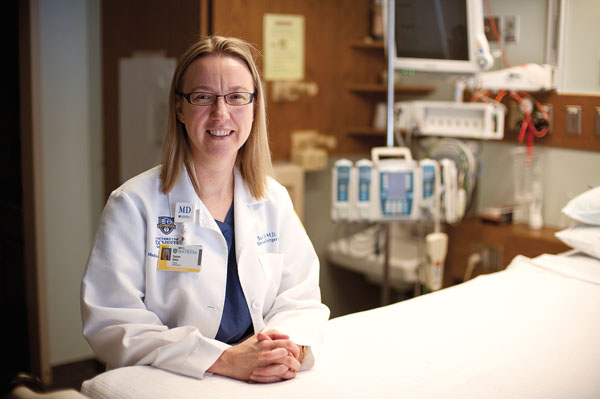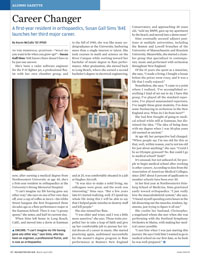Alumni Gazette
 ENCORE: “I can’t imagine my life having gone any other way,” says Sims, who has been an engineer, a professional flutist, and is now an orthopaedist. (Photo: Adam Fenster)
ENCORE: “I can’t imagine my life having gone any other way,” says Sims, who has been an engineer, a professional flutist, and is now an orthopaedist. (Photo: Adam Fenster)To the perennial question—“what do you want to be when you grow up?”—Susan Gall Sims ’84E knows there doesn’t have to be just one answer.
She’s been a radar software engineer for the F-15 fighter jet, a professional flutist with her own chamber group, and now, after earning a medical degree from Northwestern University at age 48, she’s a first-year resident in orthopaedics at the University’s Strong Memorial Hospital.
“I can’t imagine my life having gone any other way,” she says on one of her rare days off, over a cup of coffee at Java’s—the Gibbs Street hangout she first frequented three decades ago as a flute performance major at the Eastman School. Then it was “a greasy spoon,” she notes, and half its current size.
When Sims left home in Long Beach, Calif., and moved into a dorm at Eastman in the fall of 1980, she was like many undergraduates at the University, harboring more than a single interest or talent. She took courses in math and science on the River Campus while working toward her bachelor of music degree in flute performance. After graduation, she moved back to Long Beach, where she earned a second bachelor’s degree in electrical engineering, and at 25, was comfortably situated in a job at Hughes Aircraft.
“It was nice to make a solid living, my colleagues were great, and the work was interesting,” Sims says. “But a few years into it I started realizing, well, if I spend my whole life doing this I will be able to say that I helped guide missiles to destroy stuff and kill people.”
She also missed her flute.
“I was older and wiser, and I was a little more assertive,” she says. Those traits propelled her to take a leap of faith and give up her comfortable job to pursue her initial dream of a career in music. She started practicing again, auditioned successfully for the master’s degree program in flute performance at Boston’s New England Conservatory, and approaching 30 years old, “sold my BMW, gave up my apartment by the beach, and moved into a dorm room.”
Sims eventually secured adjunct positions at multiple universities, including the Boston and Lowell branches of the University of Massachusetts and Brandeis University. Meanwhile, she started a chamber group that specialized in contemporary music and performed with orchestras throughout New England.
Of the 15 years she spent as a musician, she says, “I made a living, I bought a house before the prices went crazy, and it was a life that I really enjoyed.”
Nonetheless, she says, “I came to a point where I realized, ‘I’ve accomplished everything I kind of set out to do. I have this group, I’ve played all the standard repertoire, I’ve played nonstandard repertoire, I’ve taught these great students, I’ve done some freelancing in orchestras in the New England area. What do I do from here?’”
She had first thought of going to medical school while still at Eastman, but dismissed the idea. “The idea of being done with my degree when I was 30-plus years old seemed so ancient.”
At age 40, her perspective had changed. “When people say I’m too old for this or that, well, within reason, you’re not too old for just about anything,” she says. “Could I be an Olympic gymnast? No. But could I go to medical school? Yeah!”
It’s unusual, but not unheard of, for people to begin medical school after working in other careers. According to data from the Association of American Medical Colleges, since 2007 about 5 percent of applicants to member schools have been over 30.
In her first year at Northwestern’s Feinberg School of Medicine, Sims gravitated easily toward orthopaedics. “I just really love the musculoskeletal system,” she says. “I found myself spending extra hours in the lab dissecting out the muscles, tendons, ligaments, just trying to figure it all out.”
She credits her husband, Christopher, a stagehand whom she met when she was performing with the Portland Symphony Orchestra in Maine, with making her medical career possible.
“I met him when I was just starting this journey. He says I told him I wanted to go to medical school on our first date, so he feels he was well-prepared.”

